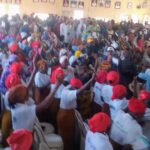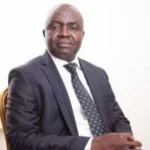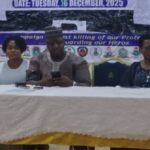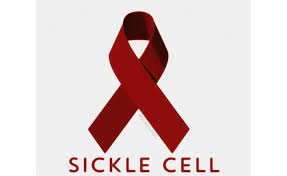By Abiemwense Moru, News Agency of Nigeria (NAN)
Each year, the globe commemorates World Sickle Cell Day (WSCD) on June 19, an event to raise awareness about Sickle Cell Disease (SCD), one of the most common hereditary blood disorders in the world.
The theme of the global observance for 2025 is “Global Action, Local Impact: Empowering Communities for Effective Self-Advocacy”, resonating across the corridors of academia, clinical settings and advocacy platforms.
SCD is a group of inherited blood disorders characterised by abnormally shaped red blood cells that resemble crescents or sickles.
The cells can block blood flow, causing severe anaemia, episodes of severe pain, recurrent infections, as well as medical emergencies like strokes, sepsis or organ failure.
In Nigeria, home to the largest population of people affected by SCD, the day carries a deeper, more urgent significance.
The burden of Sickle Cell Disease (SCD) in the country continues to strain the nation’s healthcare resources and families affected by the disorder.
This growing challenge calls for comprehensive and sustained intervention across prevention, treatment and education.
Without urgent action, including newborn screening, public awareness and access to advanced therapies, the impact on families and the healthcare system will continue to deepen.
It is a timely call for national unity in curbing the spread of this life-altering disease and improving the lives of those who live with it daily.
With an estimated 150,000 Nigerian children born each year with the disorder, according to Harvard’s Dr Maureen Achebe, the country finds itself at the epicenter of a public health crisis.
While prevention remains the ideal, early diagnosis through newborn screening is a practical and effective tool that could reduce mortality among children under five.
Achebe, a renowned hematologist and global health equity advocate from Harvard, said “these babies look normal at birth”, warning that without early detection, mortality rates could reach 50–80 per cent before the age of five, a heartbreaking figure in a country with already strained healthcare infrastructure.
“Newborn screening helps identify those with SCD early so they can receive care and therapy to live normal lives,” she added.
She advocated nationwide newborn screening programme, alongside routine preventive care such as vaccination, folic acid supplementation, and prophylaxis against infections like pneumonia and malaria.
She also dispelled cultural myths surrounding the disease, stating unequivocally that SCD is an inherited genetic disorder, not a curse or result of witchcraft, a reminder of the persistent social stigma surrounding the condition in many communities.
At the heart of Nigeria’s strategy to reduce the prevalence of SCD is prevention, and according to Prof. Patricia Lar, Acting Vice-Chancellor of Yakubu Gowon University, Abuja (formerly UniAbuja), genetic compatibility awareness must be the foundation of preventive approach.
Lar spoke through Prof. Titus Ibekwe, the Provost of the College of Health Sciences, during a public lecture titled “The Evolving Therapeutic Landscape in Sickle Cell Disease,”
She emphasised the importance of prevention as the most effective strategy in eliminating Sickle Cell Disease (SCD) in Nigeria.
She stressed that “seriously considering partner compatibility could reduce the disease to only carriers, discouraging marriages between incompatible partners.
“If we maintain this precautionary measure over time, we will be able to eliminate SCD or reduce it to a minimum world-wide ,” she added.
This message is echoed in the advocacy efforts of Mrs Aisha Edward-Maduagwu, the National Coordinator of the Association of People Living with Sickle Cell Disorder.
She called for the strict enforcement of genotype compatibility checks, especially in states like Anambra, where legislation exists but implementation lags.
“Our association has made significant strides advocating for the rights and welfare of people living with SCD.
“We urge prospective couples to prioritise genotype testing and ensure compatibility before marriage,” she said.
Beyond bone marrow transplants, gene therapy is emerging as the next frontier, according to Lar.
“This revolutionary treatment aims to correct the sickle cell gene itself, potentially offering a one-time cure.
“This is where the future of SCD treatment lies,” she noted. “It modifies the faulty gene to function like a normal gene, potentially eliminating the disease at its source.”
In recent years, the emergence of curative treatments, though limited by cost, has brought renewed hope to families affected by SCD.
The Lagos State University Teaching Hospital (LUTH) has taken significant steps forward, with successful bone marrow transplants performed since 2024.
Dr Adeseye Akinsete, a pediatric hematologist at LUTH, confirmed that all transplanted patients are alive and well, and that the centre is preparing for a third cycle in August 2025.
“This represents a major breakthrough in the country’s medical landscape.
“We are proving that advanced therapies can be delivered locally. Nigerians are beginning to trust and participate in these programmes,” he said.
Akinsete added that LUTH also offers post-transplant support services, including virtual consultations for patients outside Lagos, and has established a dedicated transplant clinic that follows up with patients who received care both locally and abroad.
The Centre of Excellence for Sickle Cell Disease Research and Training (CESRTA) at Yakubu Gowon University is playing a pivotal role in bridging the gap between research and care.
Since its inception in 2015, CESRTA has worked to provide clinical and translational research, skills training, and community outreach.
Prof. Obiageli Nnodu, CESRTA Director and Co-Chair of the 5th Global Congress on SCD, highlighted the Centre’s collaborations with both local and international partners and its mission to make advanced SCD care more accessible and affordable.
Following the recent global congress, the Coordinating Minister of Health and Social Welfare, Prof. Muhammad Pate, announced the upgrading of CESRTA to the National Centre of Excellence for SCD Research and Training, recognising its impact on national policy, research, and education.
In spite of the scientific and medical advances, the social and economic barriers to quality care for SCD patients remain significant.
Dotun Oladipupo, Chairman of the Oladipupo Foundation in Abeokuta, says medication for managing sickle cell was extremely expensive.
“Many families cannot afford life-saving therapies. This must change.”
Oladipupo called on the Federal Government to invest more in alternative medicine research, as well as to promote inclusive legislation that gives people with SCD access to equal job opportunities, education, and healthcare.
“We also need bills that protect the rights of those living with the disease, so that stigma and discrimination no longer define their everyday experience,” he said.
The unifying thread running through the events, speeches, and expert recommendations marking World Sickle Cell Day 2025 is clear: community empowerment is essential for lasting change.
Whether through genotype testing campaigns, newborn screening, accessible treatments, or public education, the solutions must be people-centered and government-supported.
As Nigeria leads the global conversation on SCD by necessity, it must also lead by example, transforming advocacy into action, policy into practice, and awareness into impact.
There is hope. There is progress. But more importantly, there is a renewed determination to ensure that future generations are born not just with knowledge of SCD, but with the power and tools to defeat it.(NANFeatures)
***If used, please credit the writer and the News Agency of Nigeria.












